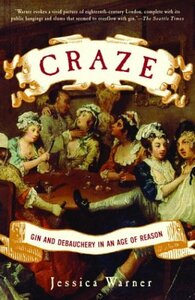Take a photo of a barcode or cover
kristykay22's review
3.0
An interesting history of how the upper-classes react when the working poor start drinking gin in addition to their beer. Sometimes a little repetitive, but a quick and worthwhile look into a very early drug war.
beckykirk's review
I tried, I really did but I just can't go on. I don't want to read a book of statistics and lists of legislations. I can't rightly star this either because I only made it 35 pages.
slferg's review
3.0
An interesting look at the effort to stop sales of gin in London in the 1700s. There were several different gin acts, but only one managed to reduce the sales - when they reduced the license to sell gin so anyone could afford it, gin lost some of its popularity as a government protest. Then, there came hard financial times where crop failures and draught caused the crops to be used for other than distilling and besides nobody could afford gin. This finally reduced the drinking of gin although it never stopped it completely. The author takes a scornful look at reformers who wanted to outlaw gin for the "good of the workers" - undercutting the work supply, people would rather drink than work, women were drinking gin and neglecting children, etc.
I got a little turned off on it by the use of "liberal", "right-wing", "proletariat", and so on strung through the history. I am almost sure the people of the 1700s did not think in those terms.
Then, she links the drinking of gin to the taking of drugs today. It is a good analogy, perhaps not perfect, but good. It would have been interesting to see the effort to stop gin compared to the effort of Prohibition in the early 1900s. In fact, I thought at first that was where the book was headed. Warner claims the drinking of gin and drugs cannot be stopped by making the sale or use illegal. That its use is caused by a complicated and underlying series or mix of things. Which makes sense.....
The book could perhaps have been put together a little better without a lot of repetition involved, but it was a fairly well researched book.
I got a little turned off on it by the use of "liberal", "right-wing", "proletariat", and so on strung through the history. I am almost sure the people of the 1700s did not think in those terms.
Then, she links the drinking of gin to the taking of drugs today. It is a good analogy, perhaps not perfect, but good. It would have been interesting to see the effort to stop gin compared to the effort of Prohibition in the early 1900s. In fact, I thought at first that was where the book was headed. Warner claims the drinking of gin and drugs cannot be stopped by making the sale or use illegal. That its use is caused by a complicated and underlying series or mix of things. Which makes sense.....
The book could perhaps have been put together a little better without a lot of repetition involved, but it was a fairly well researched book.
kathleenitpdx's review against another edition
3.0
This book got better as it went along. But I wanted to point out to the author that this is a popular history book. I found the quotes of formal, 18th-century prose not worth the time to try to decipher. In a popular history, it is OK to paraphrase! And then I found she used terms that I am not familiar with, like "fisc". Is this Canadian or British? I can find no definition that seems to fit the context.
I found the experiments in law enforcement interesting--using informers, non-jury "trials", real "activist judges" (both those out drumming up business and those trying to avoid it). You can see how the present British and US systems developed based on some of these experiences of law-makers and citizens.
I found the author's comparison of the response to the gin craze with current responses to various drug problems instructive but I don't feel that they always hold up. I can definitely see that marijuana use has a counter-culture component; and the media has certainly highlighted the impact of meth on children; but not necessarily the obverse. And I understand that meth has had a significant impact in rural areas. (The author seems to think all drug "problems" are in cities). But this book was published in 2002 so maybe she had not had a chance to "study" meth.
I found the experiments in law enforcement interesting--using informers, non-jury "trials", real "activist judges" (both those out drumming up business and those trying to avoid it). You can see how the present British and US systems developed based on some of these experiences of law-makers and citizens.
I found the author's comparison of the response to the gin craze with current responses to various drug problems instructive but I don't feel that they always hold up. I can definitely see that marijuana use has a counter-culture component; and the media has certainly highlighted the impact of meth on children; but not necessarily the obverse. And I understand that meth has had a significant impact in rural areas. (The author seems to think all drug "problems" are in cities). But this book was published in 2002 so maybe she had not had a chance to "study" meth.
